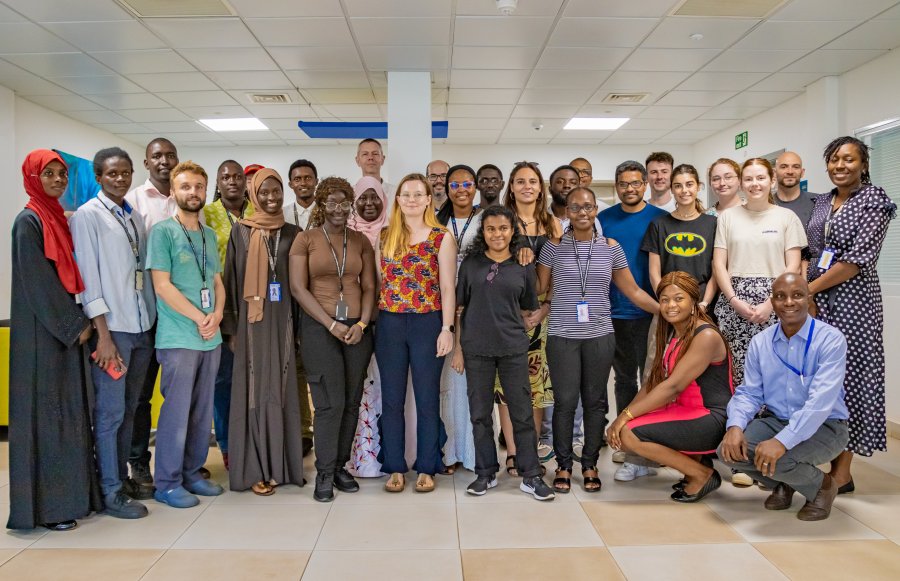
Climb Project Group Picture
The CLIMB-BIG-DATA project (Cloud Infrastructure for Big Data Microbial Bioinformatics) is a five-year endeavor spanning from 2020 to 2025. The CLIMB team includes members from the Universities of Warwick, Birmingham, Cardiff, Swansea, Bath and Leicester, MRCG and the Quadram Institute of Bioscience. The project is dedicated to delivering a cutting-edge, scalable, and dynamic bioinformatics platform. This platform aims to support academic research groups, government agencies, and health services grappling with the challenges presented by big data in modern microbiology. The team did a series of presentations on the CLIMB project and also introduced the new Jupyter notebooks. In addition, they met with the MRCG Head of Data Science, Dr Bubacarr Bah, and MRCG Head of IT, Badou Gaye, on how best the two parties could collaborate and support capacity building. A field site visit to the Brikama Health Centre was also organized in order to expose the MRC funded Doctoral Training Partnership PhD Students (MRC DTP) focusing on Microbes Microbiomes and Bioinformatics (MMB) from The University of East Anglia in Norwick, England to research data collection and study participant recruitment.
During the week long visit, the MRC DTP students came together with the MRCG doctoral students for a research symposium. The students presented their specific research and shared their PhD journeys with each other. It was interesting to see diverse areas of research (microbiome, TB, Malaria, etc.) all geared towards tackling different areas of health challenges. The symposium highlighted the commitment of MRCG and MRC DTP to advancing research methodologies through presenting innovative ideas and collaborative endeavors. It not only addressed pressing health concerns but also paved the way for new dimensions of exploration, setting the stage for transformative discoveries in the realm of microbiology and beyond.
Mark Webber, Deputy Director of the MRC PhD Programme, said “The joint student research showcase with the local PhD students offered a great opportunity for all the students to describe their projects and highlight their diverse journeys on the way to a PhD. The event also allowed opportunities for the students to identify possible collaborations.”
He added “The trip to MRC The Gambia has been an incredible experience for the MMB students who have been able to see how first-class research is done in a very different environment as well as identifying how their skills can be applied in a new context.”
Head of Data Science at MRCG, Dr Bubacarr Bah, highlighted “Computational bioinformatics and high-performance computing (HPC) are part of Data Science and these two units are inseparable from the MRCG genomics platform. The CLIMB-BIG-DATA initiative aligns a lot with these three entities and provides opportunities for collaboration between MRCG and CLIMB-BIG-DATA in bioinformatics and HPC. This visit of the CLIMB-BIG-DATA team kick-starts this collaboration.”
Eunice Kiamba, a PhD student at MRCG who co-chaired the presentation session with Prof Mark Webber fromThe London School of Hygiene and Tropical Medicine, said “The MRCG Postgraduate Academic Culture Committee that we lead is always looking forward to opportunities where we can have such great academic and social interactions especially for the PhD students at the Unit. We are grateful to the hosts of this program for supporting our very first PhD student’s symposium at the Unit where 12 of us plus seven of the visiting PhD students made presentations that were very well appreciated by all participants.”
Alice Nisbet, a PhD Student from the UK, said that “The case studies and initiatives presented to us regarding CLIMB-BIG-DATA on this trip have truly opened my eyes to the technologies available to me, especially regarding JUPYTER Notebooks, and has allowed me to begin exploring new ideas within my project. I will be using the bioinformatics capacity presented by CLIMB to enhance my research in the future. Our visit to MRC The Gambia has allowed me to network with a great number of PhD students, post-docs, and academics all of whom are carrying out exciting and groundbreaking research.”
She continued, “On top of this, learning more about the research and methodologies being carried out has developed my knowledge in a way which will no doubt allow me to enhance my own work in the future. I would love to, and hope I will one day be able to, return to MRCG to carry out research of my own in this positive, committed, and innovative environment.”
If you enjoyed this article and would like to build a career in global health, we offer a range of MSc programmes covering health and data, infectious and tropical diseases, population health, and public health and policy.
Available on campus or online, including flexible study that works around your work and home life, be part of a global community at the UK's no.1 public health university.
